BUS707 Applied Business Research: Accounting and Auditing Ethics
VerifiedAdded on 2023/06/09
|5
|1162
|296
Project
AI Summary
This research project delves into the critical role of ethics in accounting and auditing, addressing the increasing ethical standards demanded in the profession due to corporate scandals. It investigates the level of ethical reasoning in auditors' decision-making processes, the challenges they face in obtaining accurate information about ethical programs, and the difficulties in investigating breaches of ethics. The study aims to determine the significance of ethics in auditing, identify ethical rules, explore ways to adopt ethical audits, and understand how auditing ethics helps enterprises compete internationally. It employs both quantitative (surveys) and qualitative (interviews) data collection methods, supplemented by secondary data from journals and articles, while adhering to ethical considerations such as data confidentiality and voluntary participation. The research contributes to the development of solutions for improving the ethics of the audit profession by analyzing ethical theories and developments towards ethical auditing.
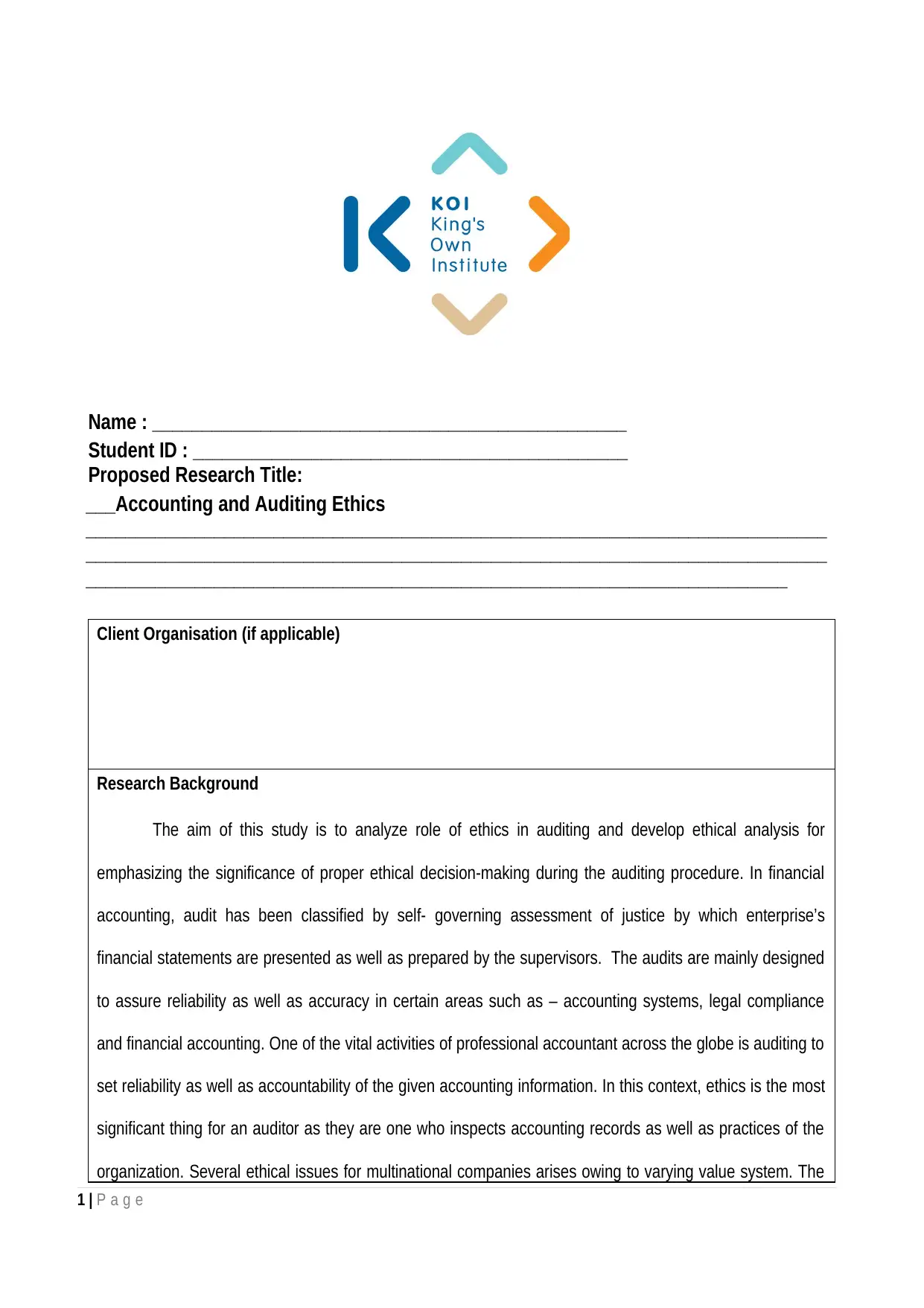
Name : ________________________________________________
Student ID : ____________________________________________
Proposed Research Title:
___Accounting and Auditing Ethics
___________________________________________________________________________
___________________________________________________________________________
_______________________________________________________________________
Client Organisation (if applicable)
Research Background
The aim of this study is to analyze role of ethics in auditing and develop ethical analysis for
emphasizing the significance of proper ethical decision-making during the auditing procedure. In financial
accounting, audit has been classified by self- governing assessment of justice by which enterprise’s
financial statements are presented as well as prepared by the supervisors. The audits are mainly designed
to assure reliability as well as accuracy in certain areas such as – accounting systems, legal compliance
and financial accounting. One of the vital activities of professional accountant across the globe is auditing to
set reliability as well as accountability of the given accounting information. In this context, ethics is the most
significant thing for an auditor as they are one who inspects accounting records as well as practices of the
organization. Several ethical issues for multinational companies arises owing to varying value system. The
1 | P a g e
Student ID : ____________________________________________
Proposed Research Title:
___Accounting and Auditing Ethics
___________________________________________________________________________
___________________________________________________________________________
_______________________________________________________________________
Client Organisation (if applicable)
Research Background
The aim of this study is to analyze role of ethics in auditing and develop ethical analysis for
emphasizing the significance of proper ethical decision-making during the auditing procedure. In financial
accounting, audit has been classified by self- governing assessment of justice by which enterprise’s
financial statements are presented as well as prepared by the supervisors. The audits are mainly designed
to assure reliability as well as accuracy in certain areas such as – accounting systems, legal compliance
and financial accounting. One of the vital activities of professional accountant across the globe is auditing to
set reliability as well as accountability of the given accounting information. In this context, ethics is the most
significant thing for an auditor as they are one who inspects accounting records as well as practices of the
organization. Several ethical issues for multinational companies arises owing to varying value system. The
1 | P a g e
Paraphrase This Document
Need a fresh take? Get an instant paraphrase of this document with our AI Paraphraser
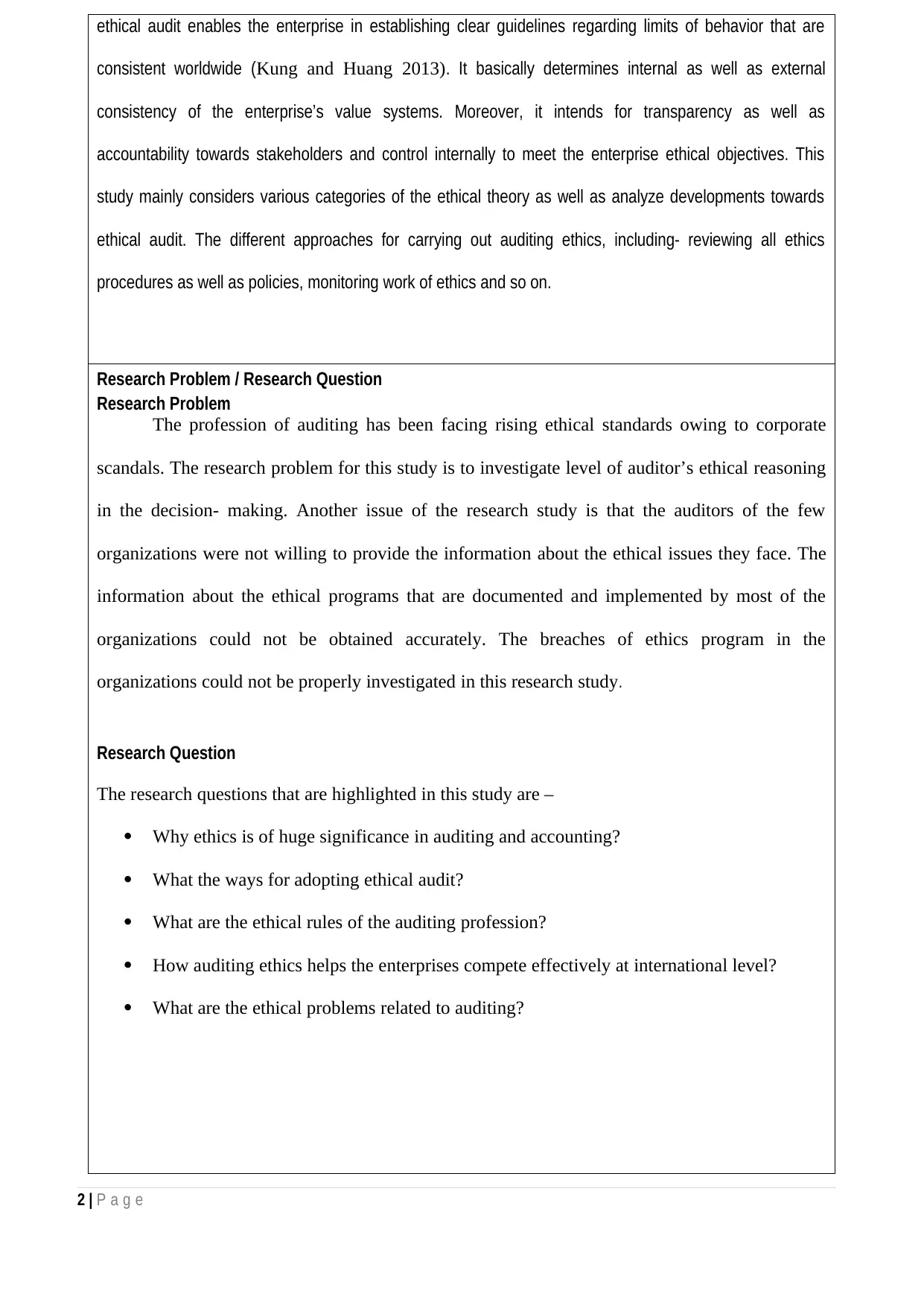
ethical audit enables the enterprise in establishing clear guidelines regarding limits of behavior that are
consistent worldwide (Kung and Huang 2013). It basically determines internal as well as external
consistency of the enterprise’s value systems. Moreover, it intends for transparency as well as
accountability towards stakeholders and control internally to meet the enterprise ethical objectives. This
study mainly considers various categories of the ethical theory as well as analyze developments towards
ethical audit. The different approaches for carrying out auditing ethics, including- reviewing all ethics
procedures as well as policies, monitoring work of ethics and so on.
Research Problem / Research Question
Research Problem
The profession of auditing has been facing rising ethical standards owing to corporate
scandals. The research problem for this study is to investigate level of auditor’s ethical reasoning
in the decision- making. Another issue of the research study is that the auditors of the few
organizations were not willing to provide the information about the ethical issues they face. The
information about the ethical programs that are documented and implemented by most of the
organizations could not be obtained accurately. The breaches of ethics program in the
organizations could not be properly investigated in this research study.
Research Question
The research questions that are highlighted in this study are –
Why ethics is of huge significance in auditing and accounting?
What the ways for adopting ethical audit?
What are the ethical rules of the auditing profession?
How auditing ethics helps the enterprises compete effectively at international level?
What are the ethical problems related to auditing?
2 | P a g e
consistent worldwide (Kung and Huang 2013). It basically determines internal as well as external
consistency of the enterprise’s value systems. Moreover, it intends for transparency as well as
accountability towards stakeholders and control internally to meet the enterprise ethical objectives. This
study mainly considers various categories of the ethical theory as well as analyze developments towards
ethical audit. The different approaches for carrying out auditing ethics, including- reviewing all ethics
procedures as well as policies, monitoring work of ethics and so on.
Research Problem / Research Question
Research Problem
The profession of auditing has been facing rising ethical standards owing to corporate
scandals. The research problem for this study is to investigate level of auditor’s ethical reasoning
in the decision- making. Another issue of the research study is that the auditors of the few
organizations were not willing to provide the information about the ethical issues they face. The
information about the ethical programs that are documented and implemented by most of the
organizations could not be obtained accurately. The breaches of ethics program in the
organizations could not be properly investigated in this research study.
Research Question
The research questions that are highlighted in this study are –
Why ethics is of huge significance in auditing and accounting?
What the ways for adopting ethical audit?
What are the ethical rules of the auditing profession?
How auditing ethics helps the enterprises compete effectively at international level?
What are the ethical problems related to auditing?
2 | P a g e
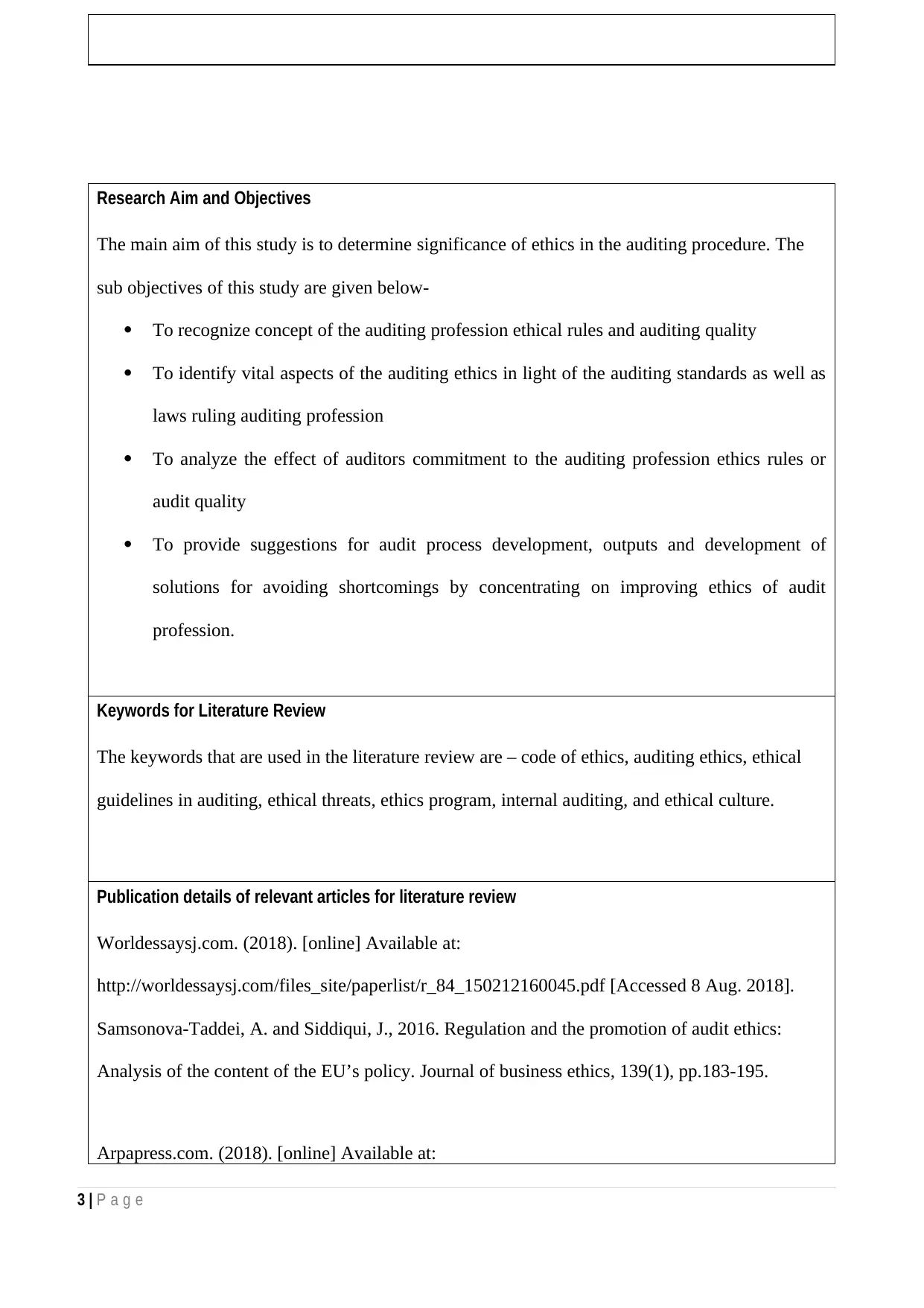
Research Aim and Objectives
The main aim of this study is to determine significance of ethics in the auditing procedure. The
sub objectives of this study are given below-
To recognize concept of the auditing profession ethical rules and auditing quality
To identify vital aspects of the auditing ethics in light of the auditing standards as well as
laws ruling auditing profession
To analyze the effect of auditors commitment to the auditing profession ethics rules or
audit quality
To provide suggestions for audit process development, outputs and development of
solutions for avoiding shortcomings by concentrating on improving ethics of audit
profession.
Keywords for Literature Review
The keywords that are used in the literature review are – code of ethics, auditing ethics, ethical
guidelines in auditing, ethical threats, ethics program, internal auditing, and ethical culture.
Publication details of relevant articles for literature review
Worldessaysj.com. (2018). [online] Available at:
http://worldessaysj.com/files_site/paperlist/r_84_150212160045.pdf [Accessed 8 Aug. 2018].
Samsonova-Taddei, A. and Siddiqui, J., 2016. Regulation and the promotion of audit ethics:
Analysis of the content of the EU’s policy. Journal of business ethics, 139(1), pp.183-195.
Arpapress.com. (2018). [online] Available at:
3 | P a g e
The main aim of this study is to determine significance of ethics in the auditing procedure. The
sub objectives of this study are given below-
To recognize concept of the auditing profession ethical rules and auditing quality
To identify vital aspects of the auditing ethics in light of the auditing standards as well as
laws ruling auditing profession
To analyze the effect of auditors commitment to the auditing profession ethics rules or
audit quality
To provide suggestions for audit process development, outputs and development of
solutions for avoiding shortcomings by concentrating on improving ethics of audit
profession.
Keywords for Literature Review
The keywords that are used in the literature review are – code of ethics, auditing ethics, ethical
guidelines in auditing, ethical threats, ethics program, internal auditing, and ethical culture.
Publication details of relevant articles for literature review
Worldessaysj.com. (2018). [online] Available at:
http://worldessaysj.com/files_site/paperlist/r_84_150212160045.pdf [Accessed 8 Aug. 2018].
Samsonova-Taddei, A. and Siddiqui, J., 2016. Regulation and the promotion of audit ethics:
Analysis of the content of the EU’s policy. Journal of business ethics, 139(1), pp.183-195.
Arpapress.com. (2018). [online] Available at:
3 | P a g e
⊘ This is a preview!⊘
Do you want full access?
Subscribe today to unlock all pages.

Trusted by 1+ million students worldwide
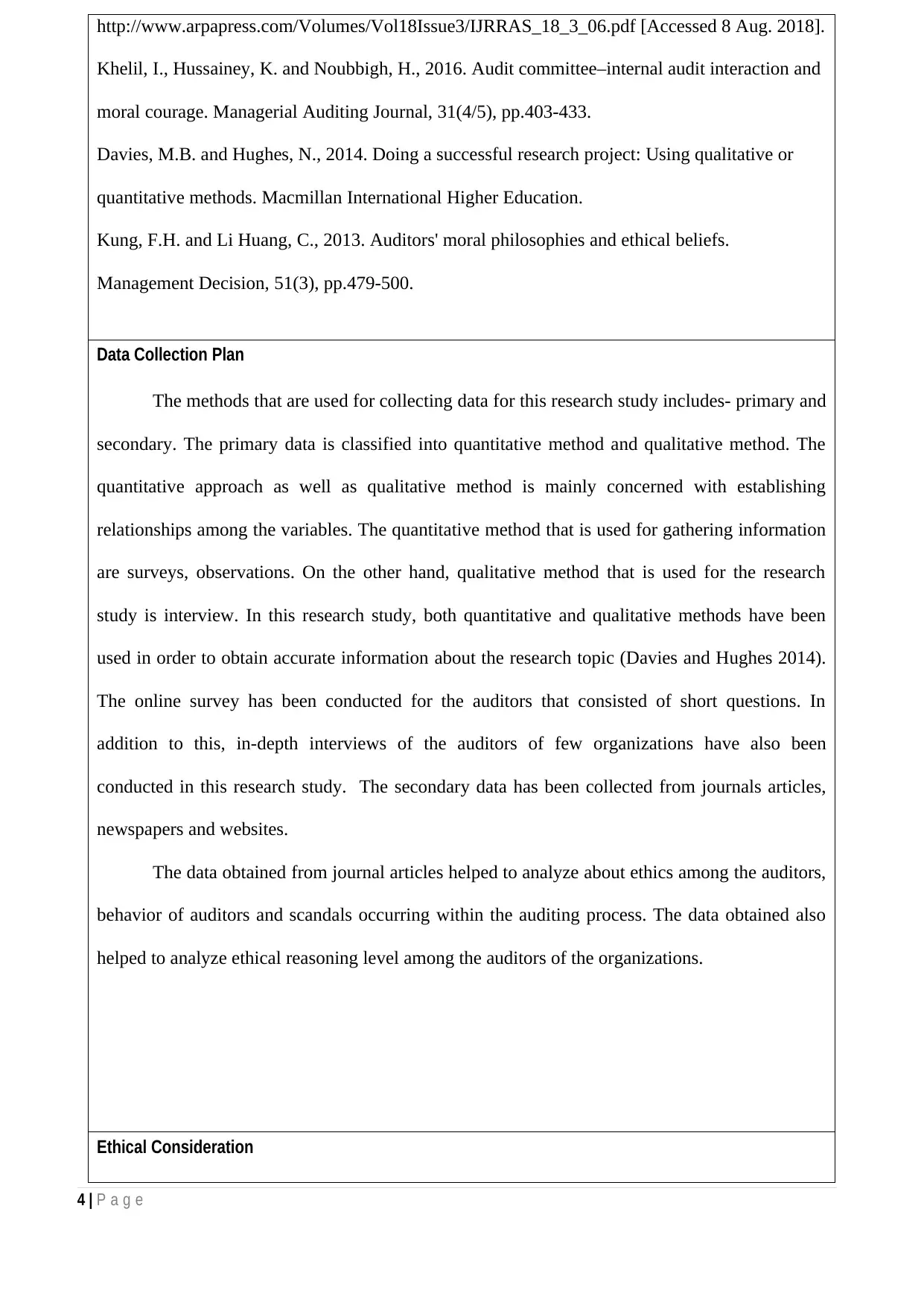
http://www.arpapress.com/Volumes/Vol18Issue3/IJRRAS_18_3_06.pdf [Accessed 8 Aug. 2018].
Khelil, I., Hussainey, K. and Noubbigh, H., 2016. Audit committee–internal audit interaction and
moral courage. Managerial Auditing Journal, 31(4/5), pp.403-433.
Davies, M.B. and Hughes, N., 2014. Doing a successful research project: Using qualitative or
quantitative methods. Macmillan International Higher Education.
Kung, F.H. and Li Huang, C., 2013. Auditors' moral philosophies and ethical beliefs.
Management Decision, 51(3), pp.479-500.
Data Collection Plan
The methods that are used for collecting data for this research study includes- primary and
secondary. The primary data is classified into quantitative method and qualitative method. The
quantitative approach as well as qualitative method is mainly concerned with establishing
relationships among the variables. The quantitative method that is used for gathering information
are surveys, observations. On the other hand, qualitative method that is used for the research
study is interview. In this research study, both quantitative and qualitative methods have been
used in order to obtain accurate information about the research topic (Davies and Hughes 2014).
The online survey has been conducted for the auditors that consisted of short questions. In
addition to this, in-depth interviews of the auditors of few organizations have also been
conducted in this research study. The secondary data has been collected from journals articles,
newspapers and websites.
The data obtained from journal articles helped to analyze about ethics among the auditors,
behavior of auditors and scandals occurring within the auditing process. The data obtained also
helped to analyze ethical reasoning level among the auditors of the organizations.
Ethical Consideration
4 | P a g e
Khelil, I., Hussainey, K. and Noubbigh, H., 2016. Audit committee–internal audit interaction and
moral courage. Managerial Auditing Journal, 31(4/5), pp.403-433.
Davies, M.B. and Hughes, N., 2014. Doing a successful research project: Using qualitative or
quantitative methods. Macmillan International Higher Education.
Kung, F.H. and Li Huang, C., 2013. Auditors' moral philosophies and ethical beliefs.
Management Decision, 51(3), pp.479-500.
Data Collection Plan
The methods that are used for collecting data for this research study includes- primary and
secondary. The primary data is classified into quantitative method and qualitative method. The
quantitative approach as well as qualitative method is mainly concerned with establishing
relationships among the variables. The quantitative method that is used for gathering information
are surveys, observations. On the other hand, qualitative method that is used for the research
study is interview. In this research study, both quantitative and qualitative methods have been
used in order to obtain accurate information about the research topic (Davies and Hughes 2014).
The online survey has been conducted for the auditors that consisted of short questions. In
addition to this, in-depth interviews of the auditors of few organizations have also been
conducted in this research study. The secondary data has been collected from journals articles,
newspapers and websites.
The data obtained from journal articles helped to analyze about ethics among the auditors,
behavior of auditors and scandals occurring within the auditing process. The data obtained also
helped to analyze ethical reasoning level among the auditors of the organizations.
Ethical Consideration
4 | P a g e
Paraphrase This Document
Need a fresh take? Get an instant paraphrase of this document with our AI Paraphraser
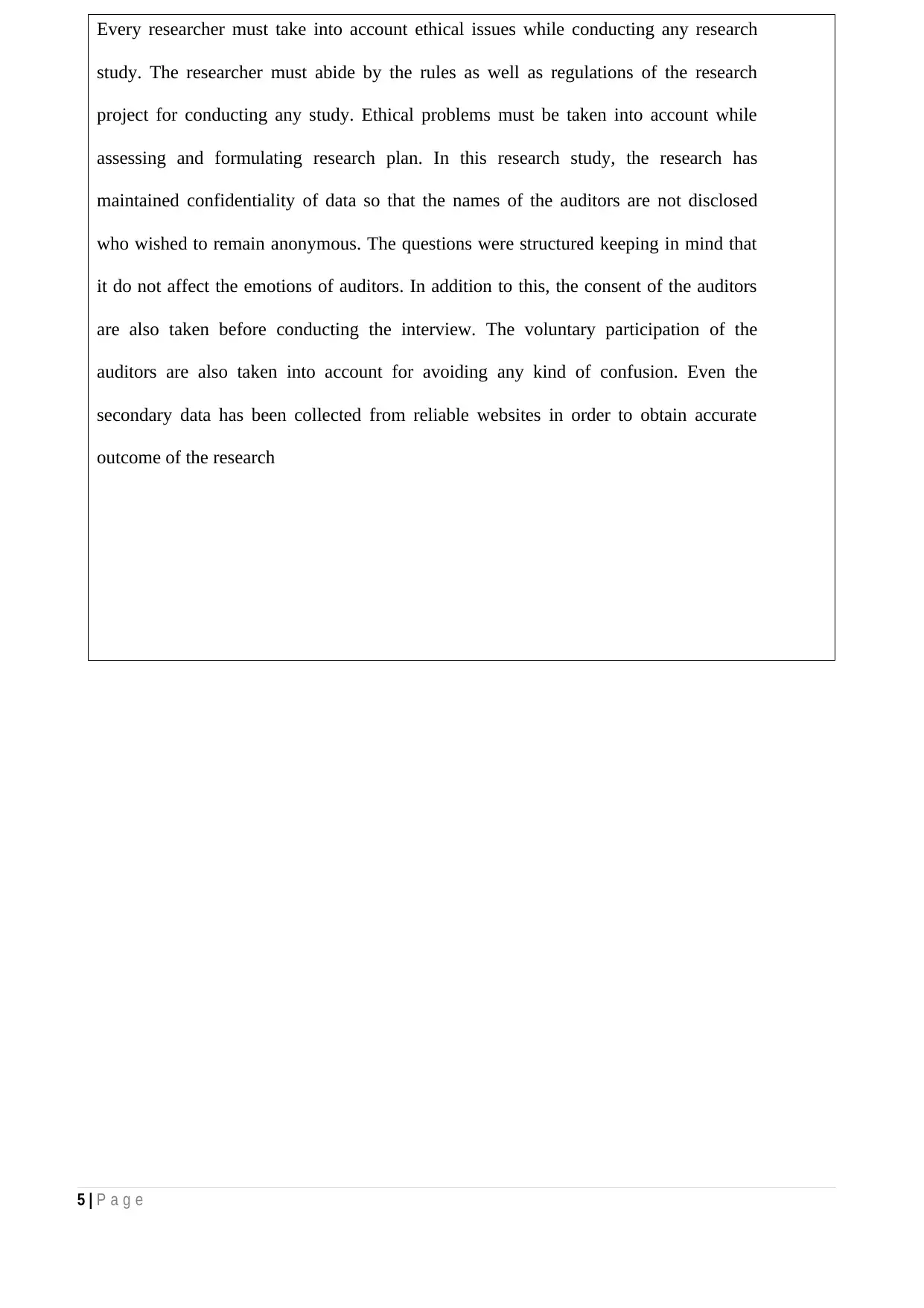
Every researcher must take into account ethical issues while conducting any research
study. The researcher must abide by the rules as well as regulations of the research
project for conducting any study. Ethical problems must be taken into account while
assessing and formulating research plan. In this research study, the research has
maintained confidentiality of data so that the names of the auditors are not disclosed
who wished to remain anonymous. The questions were structured keeping in mind that
it do not affect the emotions of auditors. In addition to this, the consent of the auditors
are also taken before conducting the interview. The voluntary participation of the
auditors are also taken into account for avoiding any kind of confusion. Even the
secondary data has been collected from reliable websites in order to obtain accurate
outcome of the research
5 | P a g e
study. The researcher must abide by the rules as well as regulations of the research
project for conducting any study. Ethical problems must be taken into account while
assessing and formulating research plan. In this research study, the research has
maintained confidentiality of data so that the names of the auditors are not disclosed
who wished to remain anonymous. The questions were structured keeping in mind that
it do not affect the emotions of auditors. In addition to this, the consent of the auditors
are also taken before conducting the interview. The voluntary participation of the
auditors are also taken into account for avoiding any kind of confusion. Even the
secondary data has been collected from reliable websites in order to obtain accurate
outcome of the research
5 | P a g e
1 out of 5
Related Documents
Your All-in-One AI-Powered Toolkit for Academic Success.
+13062052269
info@desklib.com
Available 24*7 on WhatsApp / Email
![[object Object]](/_next/static/media/star-bottom.7253800d.svg)
Unlock your academic potential
Copyright © 2020–2025 A2Z Services. All Rights Reserved. Developed and managed by ZUCOL.





